The U.S. Senate has agreed to advance a landmark transparency bill compelling the release of federal records related to Jeffrey Epstein, following an extraordinary and near-unanimous vote in the House of Representatives. The legislation is now on track to reach President Donald Trump, who has indicated he will sign it after earlier opposition from himself and his allies.
A rare bipartisan moment in the House
The Epstein Files Transparency Act passed the House with overwhelming support, achieving one of the most lopsided votes of the congressional session. Only a single representative opposed the measure. Lawmakers across the political spectrum framed the bill as an overdue step toward public accountability, arguing that years of secrecy had bred mistrust in both federal investigations and the justice system more broadly.
The bill obliges the Department of Justice and associated agencies to release all non-classified documents tied to Epstein’s operations, relationships, and investigations. Limited redactions will be permitted only to protect victims’ identities or safeguard ongoing inquiries.
Senate agrees to fast-track passage
Within hours of the House vote, Senate leadership confirmed that the chamber would approve the bill without amendment. The rapid movement reflects intense political pressure from the public, who have long demanded visibility into the full scope of Epstein’s network and the federal government’s handling of the case.
By choosing not to alter the bill, senators ensured that once formally transmitted, the legislation can go directly to the White House for signature without requiring further negotiation between the two chambers.
Trump’s reversal and shifting political winds
President Donald Trump, who had previously criticised the legislation, reversed course after the scale of the House vote made continued resistance untenable. His allies, some of whom had initially tried to slow the measure, also withdrew their objections. Political analysts suggest the shift reflects a calculation that opposing transparency would carry greater political cost than supporting it.
The White House has now publicly signalled that the President intends to sign the bill, avoiding a clash with Congress and aligning himself with the public’s demand for disclosure.
Transparency vs. privacy concerns
Despite broad support, the bill’s passage has reignited debate about victim protection, investigative integrity, and the possible consequences of releasing names found in federal records. Some lawmakers warned that individuals who were never charged with any offence could face reputational harm if their names appear out of context.
Others countered that the exceptional nature of the Epstein case — involving institutional failures, powerful associates, and decades of unanswered questions — makes transparency a necessary corrective, even if uncomfortable for some.
Next steps and implications
Once signed into law, the Department of Justice will be given a limited timeframe to prepare and release the documents. Legal experts expect a contentious period ahead, with advocacy groups watching closely for excessive redactions or delays. The bill sets a significant precedent: rarely has Congress united so firmly to force disclosure in a high-profile criminal matter involving political, financial, and international sensitivities.
If fully implemented, the release of the Epstein files could reshape public understanding of the case, expose previously hidden networks, and raise new questions about the failures that allowed Epstein to operate for so long.
Newshub Editorial in North America – 2025-11-19



Recent Comments